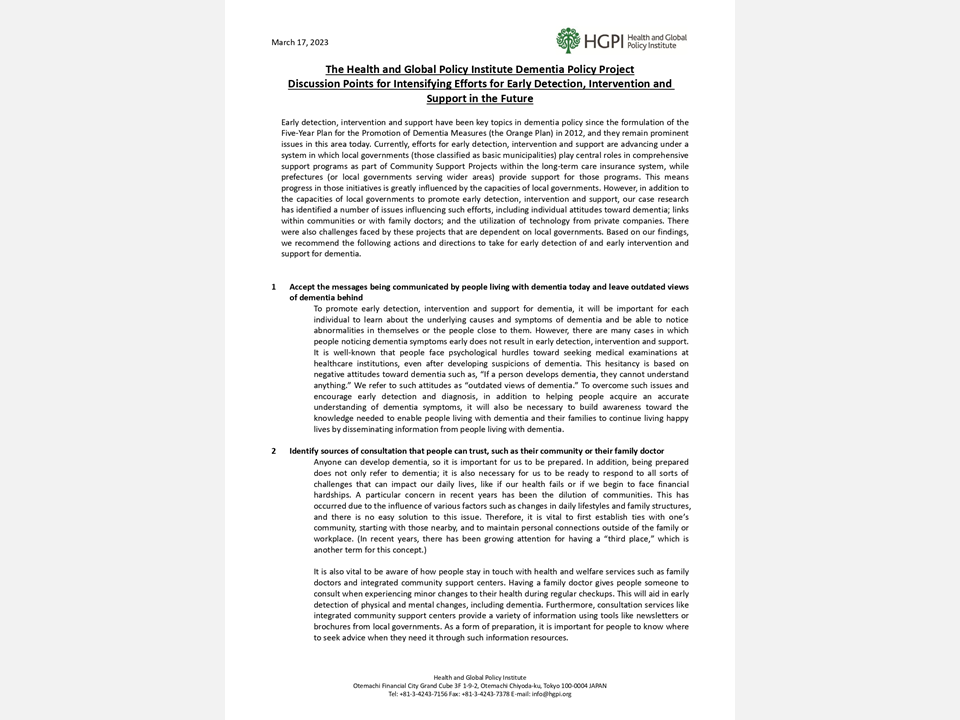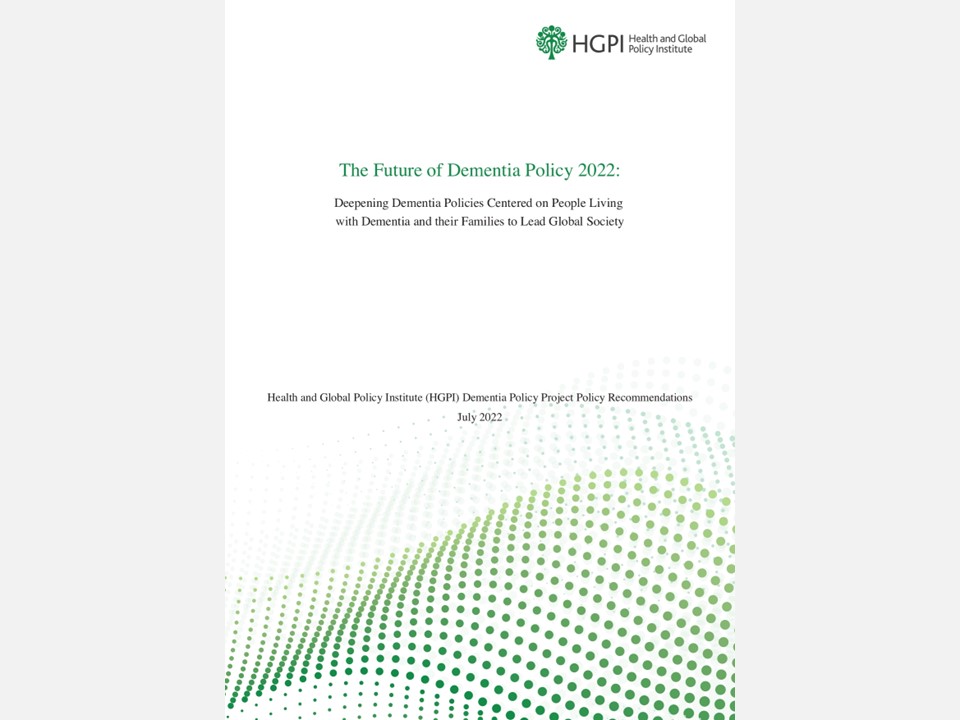[Publication Report] “Best Practices in Promoting Early Dementia Detection, Intervention and Support” (March 17, 2023)
date : 4/3/2023
Tags: Dementia
![[Publication Report] “Best Practices in Promoting Early Dementia Detection, Intervention and Support” (March 17, 2023)](https://hgpi.org/en/wp-content/uploads/sites/2/dementia-20230317-top_ENG.png)
Today, Health and Global Policy Institute (HGPI) presented “Best Practices in Promoting Early Dementia Detection, Intervention and Support,” which is a compilation of innovative initiatives for promoting early detection, intervention and support for dementia based on hearings with related parties. For details, please see the PDF linked below.
For many years, HGPI has worked to identify and address various policy issues surrounding dementia. In July 2022, we presented policy recommendations based on knowledge acquired over the course of those activities titled, “The Future of Dementia Policy 2022: Deepening Dementia Policies Centered on People Living with Dementia and their Families to Lead Global Society.” In those recommendations, we arranged topics for future dementia policy in terms of four perspectives: the social environment, care, research, and political leadership. Of those four perspectives, the recommendations presented today are mainly focused on “care” with the objective of advancing measures for early detection, intervention and support in a manner that is based on the needs of people living with dementia and those close to them.
Since the formulation of the Five-Year Plan for the Promotion of Dementia Measures (the Orange Plan) in 2012 to today, dementia policies in Japan have consistently included early detection, intervention and support as prominent topics. Current efforts for early detection, intervention and support are advancing under a system in which local governments (those classified as basic municipalities) play central roles in comprehensive support programs as part of Community Support Projects within the long-term care insurance system, while prefectures (or local governments serving wider areas) provide support for those programs. This means progress in efforts to promote early detection, intervention and support is heavily influenced by the capacities of local governments. To further promote these efforts throughout the country, it will be important to horizontally disseminate initiatives from innovative municipalities to other municipalities. Promoting early detection, intervention and support, however, is not something that should depend entirely on the solitary efforts of officials at municipal governments. Expectations are high for wide-ranging collaboration with health and welfare professionals in communities and other multi-stakeholders to build effective and efficient systems for responding to this issue within the framework of the Integrated Community Care System. There have been examples of initiatives in which municipalities collaborated with parties like citizen and patient advocacy organizations, health and long-term care facilities, or private companies, and it is desirable for there to be further progress in such initiatives driven by diverse stakeholders.
In this project, we held hearings with stakeholders engaged in a number of groundbreaking initiatives for the further advancement of early detection, intervention and support. Aiming to see good examples spread to other municipalities, in “Best Practices in Promoting Early Dementia Detection, Intervention and Support,” we have done our best to compile details from each initiative, issues that were overcome throughout their processes, and challenges that were encountered when doing so.
For details, please see the PDF attached below.
Top Research & Recommendations Posts
- [Policy Recommendations] The Path to a Sustainable Healthcare System: Three Key Objectives for Public Deliberation (January 22, 2026)
- [Research Report] Perceptions, Knowledge, Actions and Perspectives of Healthcare Organizations in Japan in Relation to Climate Change and Health: A Cross-Sectional Study (November 13, 2025)
- [Research Report] The 2025 Public Opinion Survey on Healthcare in Japan (March 17, 2025)
- [Policy Recommendations] Reshaping Japan’s Immunization Policy for Life Course Coverage and Vaccine Equity: Challenges and Prospects for an Era of Prevention and Health Promotion (April 25, 2025)
- [Research Report] The 2023 Public Opinion Survey on Satisfaction in Healthcare in Japan and Healthcare Applications of Generative AI (January 11, 2024)
- [Research Report] AMR Policy Update #4: Cancer Care and AMR (Part 1)
- [Policy Recommendations] Developing a National Health and Climate Strategy for Japan (June 26, 2024)
- [Public Comment Submission] “Assessment Report on Climate Change Impacts in Japan (Draft Overview)” (December 24, 2025)
- [Research Report] Survey of Japanese Physicians Regarding Climate Change and Health (December 3, 2023)
- [Research Report] The Public Opinion Survey on Child-Rearing in Modern Japan (Final Report) (March 4, 2022)
Featured Posts
-
2026-01-09
[Registration Open] (Hybrid Format) Dementia Project FY2025 Initiative Concluding Symposium “The Future of Dementia Policy Surrounding Families and Others Who Care for People with Dementia” (March 9, 2026)
![[Registration Open] (Hybrid Format) Dementia Project FY2025 Initiative Concluding Symposium “The Future of Dementia Policy Surrounding Families and Others Who Care for People with Dementia” (March 9, 2026)](https://hgpi.org/en/wp-content/uploads/sites/2/dementia-20260309-top.png)
-
2026-02-05
[Registration Open] (Webinar) The 141st HGPI Seminar “Current Status and Future Prospects of Korea’s Obesity Policy: Voices of People with Lived Experience in Policy Promotion” (March 3, 2026)
![[Registration Open] (Webinar) The 141st HGPI Seminar “Current Status and Future Prospects of Korea’s Obesity Policy: Voices of People with Lived Experience in Policy Promotion” (March 3, 2026)](https://hgpi.org/en/wp-content/uploads/sites/2/hs141-top-1.png)
-
2026-02-06
[Research Report] AMR Policy Update #5: Cancer Care and AMR (Part 2)
![[Research Report] AMR Policy Update #5: Cancer Care and AMR (Part 2)](https://hgpi.org/en/wp-content/uploads/sites/2/HGPI_20260204_AMR-Policy-Update-5.png)






